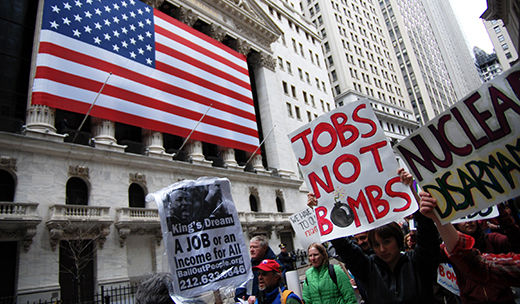
Under cover of the recession, companies laid off over 7 million workers, in 2009 alone. These savage layoffs led to record increases in workers’ productivity. The value that workers produce each hour has gone up. That means that the workers left on the job are forced to work harder to produce more. Who is getting this increased value the average workers have produced?
The workers are not getting the extra value they have created; their pay has not gone up. The recession has been used to increase the rate of exploitation. Are the companies who hire the workers getting it? True, they take the first bite out of the profits workers produce with their labor. But only the first bite, because the employer must pay off all of the vampires who feed on the workers. First the employer pays the banks that may well get the biggest part of the profits. Then the landlord must be paid. Landlords continue to raise rents, Recession or no recession. The big oil and energy companies are also raising their prices. That way they take another part out of the profit. Last, come the taxes, even though many of the biggest companies get out of paying taxes.
So the profit is divided into many parts. There is fierce fighting as to who gets the biggest part of the profit the workers produce. The banks, insurance companies and Wall Street gambling companies are gaining control of the economy. They are grabbing the largest part of the profits, compared to manufacturing, transportation and construction companies. Other ways in which workers are cheated out of the value they produce include paying monopoly prices for necessities such as medicines and gas. Raising workers’ taxes is yet another way of taking more of the value that workers produce.
Taxes are needed to fund the government and provide the services we need. In fact, the government needs a lot more revenue to fight the recession. We need more social services and bigger stimulus packages to save and create jobs. But the important question is, “Who should pay these taxes?”
The short answer is: those who can afford it should pay, or, “Tax the rich.” This fair principle of taxation is called “progressive.” Recessive taxes, such as sales taxes, put the main tax burden on working people. Fighting for progressive taxes is an important part of the class struggle. An example is the fight to fund health care reform. The House bill pays for it with a millionaire’s tax. But the Senate bill taxes workers’ health benefits. Another fierce struggle is to end the huge Bush tax cuts for the rich. Those cuts made the income tax less progressive and helped bring on the Great Recession.
At first, the federal income tax was progressive. Few workers paid it, only 4 million in 1939. By 1945, 43 million had to pay. Inflation had reduced the value of the individual cash exemptions. However, notice the rate millionaires paid, 94%! But they hired accountants who got them off of paying what they should.
Even in the official, Bush-era history of the federal income tax, they admit the Reagan tax cut of 1981 “represented a fundamental shift in the course of federal income tax policy. This brought the top tax bracket down to 50 percent.”. . . “Over the 22-year period from 1964 to 1986 the top individual tax rate was reduced from 91 to 28 percent.” The Bush tax cut for the rich depressed that top rate even more. Tax cuts for the rich and the huge budget for the Iraq and Afghanistan wars have doubled the federal debt. To get out of the Great Recession, our country needs change, change to a progressive tax policy.
State budget crises have also been worsened by letting the rich off and shifting the tax burden to working people. To make it worse in Illinois, the state has a flat income tax and faces a $13 billion budget shortfall. The individual tax rate is 3%, the same rate if you make $20,000 a year or $20 million. Already, state employees are being laid off and vital services have been cut back. A good coalition has been formed to save public workers jobs and the important services they supply. But they have been misled to support a 60% tax increase for individuals and only 8% increase for corporations. While the Communist Party of Illinois supports the coalition’s protests against cuts, the Communists call for a tax increase on higher incomes only. Also, they are fighting for a second federal stimulus to help states maintain services and prevent state layoffs.
Photo: http://www.flickr.com/photos/jonathanmcintosh/ / CC BY-SA 2.0

MOST POPULAR TODAY


Zionist organizations leading campaign to stop ceasefire resolutions in D.C. area

Communist Karol Cariola elected president of Chile’s legislature

Afghanistan’s socialist years: The promising future killed off by U.S. imperialism

High Court essentially bans demonstrations, freedom of assembly in Deep South






Comments